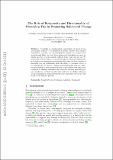The Role of Reciprocity and Directionality of Friendship Ties in Promoting Behavioral Change
Author(s)
Almaatouq, Abdullah; Radaelli, Laura; Pentland, Alex; Shmueli, Erez
DownloadAccepted version (1.083Mb)
Open Access Policy
Open Access Policy
Creative Commons Attribution-Noncommercial-Share Alike
Terms of use
Metadata
Show full item recordAbstract
© Springer International Publishing Switzerland 2016. Friendship is a fundamental characteristic of human beings and usually assumed to be reciprocal in nature. Despite this common expectation, in reality, not all friendships by default are reciprocal nor created equal. Here, we show that reciprocated friendships are more intimate and they are substantially different from those that are not. We examine the role of reciprocal ties in inducing more effective peer pressure in a cooperative arrangements setting and find that the directionality of friendship ties can significantly limit the ability to persuade others to act. Specifically, we observe a higher behavioral change and more effective peer-influence when subjects shared reciprocal ties with their peers compared to sharing unilateral ones. Moreover, through spreading process simulation, we find that although unilateral ties diffuse behaviors across communities, reciprocal ties play more important role at the early stages of the diffusion process.
Date issued
2016Department
Sloan School of ManagementPublisher
Springer International Publishing
Citation
Almaatouq, Abdullah, Radaelli, Laura, Pentland, Alex and Shmueli, Erez. 2016. "The Role of Reciprocity and Directionality of Friendship Ties in Promoting Behavioral Change."
Version: Author's final manuscript
ISSN
0302-9743
1611-3349